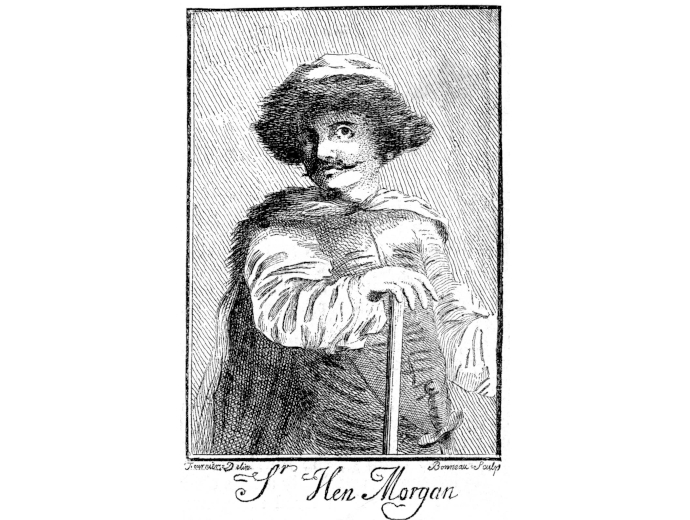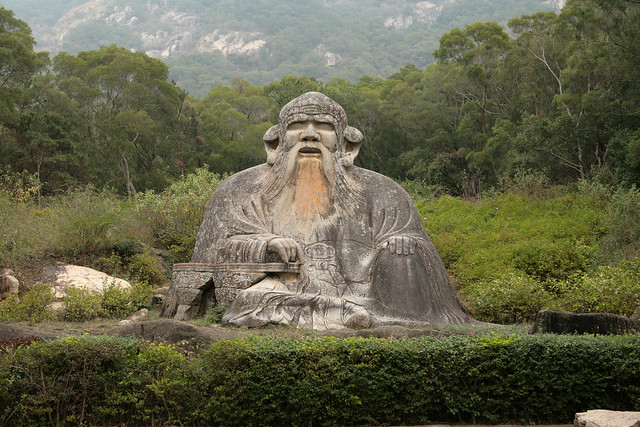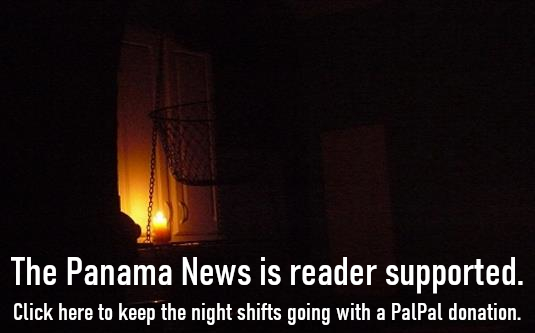Supplying pirate ships was once a good business.
Defend Panama, but not its asset protection law firms
One upon a time, maritime piracy was big business in this part of the world. It even sometimes put on religious airs.* Panama was part of the Spanish Main, a prized target for British, French and Dutch raiders but by and large an impossible place to hold and colonize.
The Caribbean islands were different stories. Especially the Lesser Antilles but also Jamaica and Hispaniola were hotly contested and changed hands among the European powers.
In the early years destitute people, many of them runaway indentured servants, set up their Caribbean shops as “bucaneros,” people who smoked and dried meat to sell as ships’ provisions. Their original bastions were on the northwest coast of Hispaniola in what’s now Haiti and on the island of Tortuga.
European imperial rivalries brought naval warfare to the area as soon as it was known that the Spanish Main was exporting gold and silver to Spain, with a share to The Vatican. It was briefly a good time for the bucaneros’ business, which in turn brought on efforts to take away or suppress their trade.
Meanwhile, naval warfare being expensive and the cost of war on the European continent and adjacent island being ruinous, it became more economical to privatize the raids on Spanish shipping and the Spanish Main. The British, French and Dutch issued Letters of Marque, charters for such things. Under some crown’s charter or as independent freebooters, the bucaneros often signed on to privateer or pirate ships to make their fortunes, often to then be invested in safer and more respectable businesses as ship chandlers, in more promising havens like New Providence in the Bahamas or Port Royal in Jamaica.
There came a time when the Spanish had plucked all of the easy gold and silver pickings from the Americas and had less to send back to Spain, when the religious wars of Europe ended in exhaustion, and the half-truces that allowed for fighting to continue in the Americas became pointless annoyances for the powers involved. By general agreement piracy was suppressed and the once thriving business of providing supplies to pirate ships died out.
Fast forward to the late 20th century and a “new economy” based on financial manipulations, fraud and tax evasion arose in the once dominant but crumbling industrial economies. In the extractive economies of the Third World, political castes were skimming what they could, enormous sums from individual perspectives, enough for revolutions and terrible retribution from the viewpoints of nations. The “winners” needed places to park their funds and only the dumb ones trusted investment in the Trumps. The tax havens / money laundering mills, established earlier in the 20th century, got into their heyday.
But times and power relationships have changed. There are no longer so many well paid jobs in the advanced societies. Epidemics, climate disasters, potholes and falling bridges all demand costly responses and the introduction of private scams into the responses here and there has not gone well. An individual might want to hire Odebrecht to fix the roads because of the kickbacks to be gained personally, but this sort of business is by many lights unsustainable for nations.
Thus there is a sea change in international attitudes. Just like the weight of public opinion and national policies fell down against piracy and the businesses that depended on it starting in earnest not too many decades after Morgan’s raid on Panama, there is an inexorable movement against kleptocracy and tax evasion AND the businesses that depend on it. Just like the bucaneros of Tortuga, the “offshore asset protection” business of Panama is being rendered obsolete.
Most Panamanians derive no benefit from the law firms that organize chains of shell companies with numbered bank accounts for the world’s kleptocrats and tax cheats. Corporate secrecy meant for us that when a politically connected importer switched labels and a government lab depending on those labels mixed poison into cough syrup, those who were affected and their families had no recourse against the import company’s owners. The money laundering mill of which Panama is but one component had the Martinelli Linares brothers flying around in a private jet while rural public education broke down in Panama. It put incompetent people with illustrious surnames in our public executive posts and an amoral and grasping political caste in control of our legislature.
In the global scheme of things, Panama is no longer the player that it was. Have we been surpassed by South Dakota? Or by Andorra or the British Virgin Islands? However, we are still a place where the game is played and are a convenient “nearshore” location for those who would assign blame, in good faith or bad. Blame, and sanctions, are being imposed on the whole nation for an industry in which few of us have any stake.
The last thing that Panamanians should be doing is standing with President Cortizo in defense of a few corporate law firms. We should instead be demanding a reorganization of our economy and of our politics to end that sort of law practice.
* A footnote about religious warfare in Panama
Panama separated from Colombia shortly after the end of the Thousand Days War, taking us out of the Colombian paradigm of endless civil conflicts between that country’s Liberal and Conservative parties. Essentially Panamanian independence was by way of a US-backed Conservative coup on a mainly Liberal isthmus. One of the huge issues of those wars was that the Conservatives were for establishing the Catholic Church as the official religion, while the Liberals were for a secular state. The argument started centuries earlier and raised its head in many ways.
In Panamanian schools they talk about “El Corsario Morgan” – Morgan the Pirate – laying waste to Panama Viejo. But really, who was this man? From a British perspective, not a criminal pirate but a privateer under crown charter, who arguably stretched its scope but was rewarded for his rampage across Panama by being made Lord Lieutenant Governor of Jamaica. They even knighted him.
Before that? A young Welshman obliged to seek his fortune outside of the British Isles because his father was a major supporter of Oliver Cromwell’s Puritan revolution that executed the king and was thus the family was in disgrace after Cromwell died and the monarchy was restored. But like his father and the rest of the Puritans, Henry Morgan was a serious anti-Catholic bigot. Everywhere in Panama that he went, he physically attacked the Catholic Church. He executed prisoners because they were Catholics. His raid into Panama, put into a European historiography, was one of the last offensives – unless you want to count Northern Ireland – of the Wars of The Reformation.
So why don’t Panamanian schools teach this context about Henry Morgan, nor about the Wars of the Reformation, nor about the Holy Inquisition in Panama, nor how Simón Bolívar’s liberation of Gran Colombia was in large part a struggle between free-thinking Masons like Bolívar and a Catholic hierarchy that supported the Spanish Crown, nor about the religious tinge to all the warfare in the Colombian period? It’s because a tacit deal was struck. There would be freedom of religion here, but also an official acknowledgment that this is a mostly Catholic country. The public schools would teach Catholic catechism to those students whose parents wanted it, but would teach nothing of the religious conflicts that have stained our history. All the religious strife was supposed to be forgotten. In hindsight, it looks like a bad deal. Better if kids were taught the full facts of this historical subject and offered the opinion that allowing religious differences to degenerate into violence and warfare is a stupid and evil thing to do.
13th century CE sculpture of Lao Tzu at Quanzhou, in Fukian province. Photo © tom@hk.
To lead people, walk behind them.
Lao Tzu
Bear in mind…
The main dangers in this life are the people who want to change everything or nothing.
Nancy Astor
The first duty of government is to protect the powerless against the powerful.
Code of Hammurabi
America is an enormous frosted cupcake in the middle of millions of starving people.
Gloria Steinem
Contact us by email at fund4thepanamanews@gmail.com
To fend off hackers, organized trolls and other online vandalism, our website comments feature is switched off. Instead, come to our Facebook page to join in the discussion.
These links are interactive — click on the boxes














